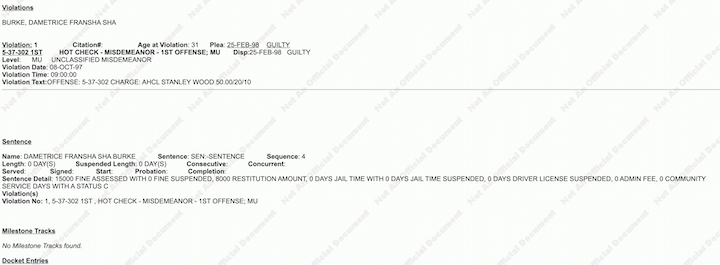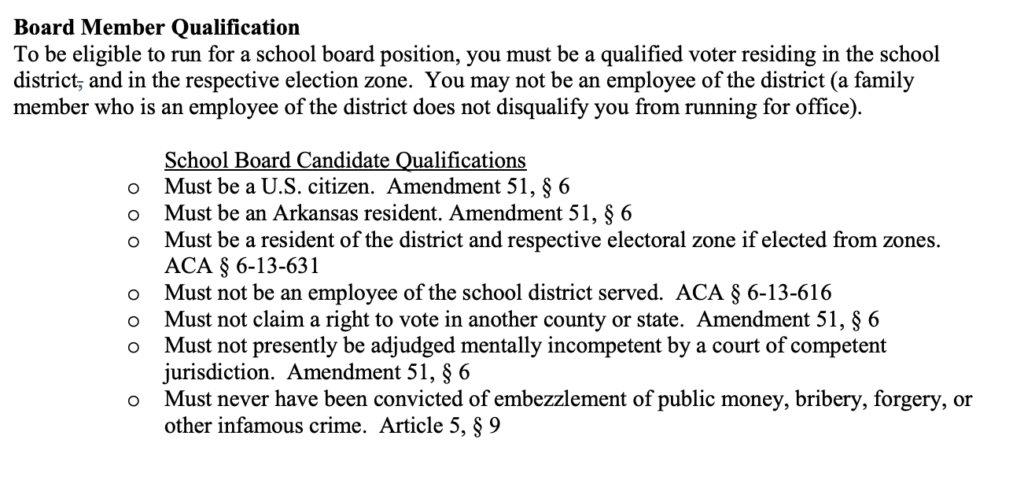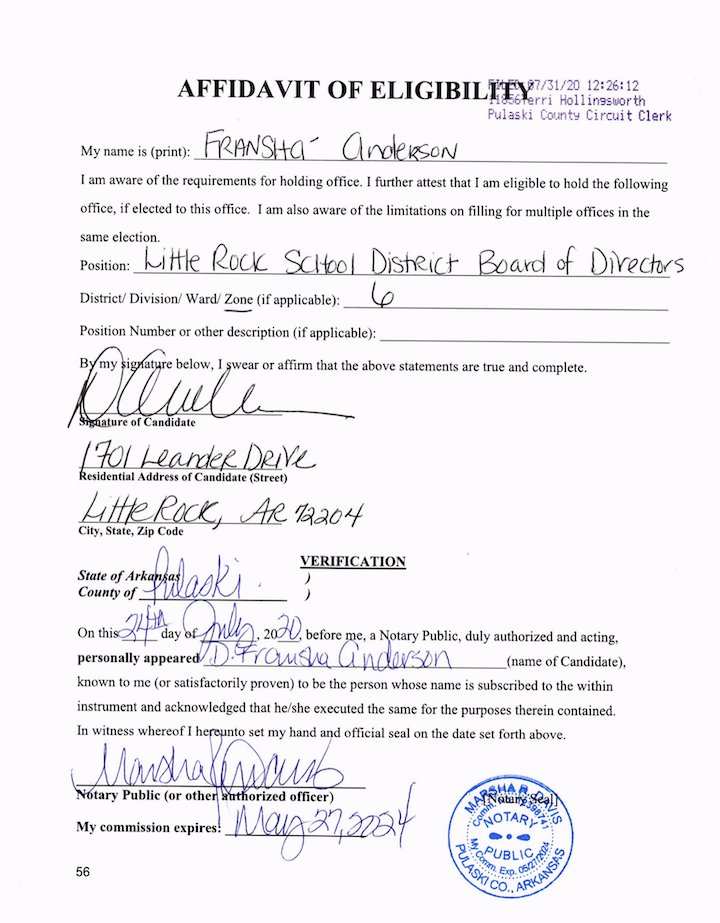It seems that Amendment 95 to the Arkansas Constitution keeps coming up these days. A little over a week ago, it popped up regarding Craighead County Judge Marvin Day’s ill-fated plan to run for Mayor of Jonesboro. Now, a different part of the amendment appears to be relevant to the candidacy of Little Rock School Board hopeful FranSha’ Anderson.
First, some background. FranSha’ Anderson’s legal name is Dametrice FranSha’ Burke, as that what it was changed back to as part of her 2019 divorce.1

A search of court records for Dametrice Burke returns a variety of entries. The ones relevant to this post are two convictions for hot checks in Independence County in 1997, in cases BAICT-97-4511 and BAICT-97-4512, and another apparent hot-check conviction in White County in 1999 in case SEK-00-72591.2


There is also case number PCCR-07-459, in Pulaski County District Court, which contains this docket entry on March 13, 2007: “DESCRIPTION:ARKANSAS STATE POLICE VIOL DESCRIPTION:THEFT OF PROPERTY B FELONY.” This is followed by an entry on March 15, 2007, stating: “JUDGE (GRUBER, WAYNE A) ORDERS TRANSFER OF THIS CASE TO COURT OF APPROPRIATE JURISDICTION.” A Google search for “Dametrice Burke theft of property Arkansas” turns up this report from Arkansas Legislative Audit, which includes this entry:

A Department of Finance Administration report from 2009 also included this:

Now, inasmuch as district courts do not hear felony cases, it would appear that Burke was initially charged with felony theft based on her misuse of a state credit card, and that case was transferred from district court to the appropriate circuit court. She then apparently pleaded guilty to a lesser misdemeanor theft charge. However, no records of that conviction appear in Court Connect, which makes one wonder if that conviction was later sealed.
Here is the thing, though: even if the theft conviction in PCCR-07-459 was sealed, the hot-check convictions would nevertheless make her ineligible.
As you might recall, it was a hot-check conviction that kept former State Rep. Josh Johnston from being able to run for sheriff in Cleburne County until he had that conviction sealed in 2014.3 This is because, a hot-check conviction, as explained by the Arkansas Supreme Court, meets the definition of “infamous crime” contained in Article V, sec. 9(b)(4), since such a conviction includes an element of intent to defraud.4 The relevant law, as clarified5 through Amendment 95, is contained in Article V, section 9, of the Arkansas Constitution, which states:
(a) No person convicted of embezzlement of public money, bribery, forgery, or other infamous crime is eligible to the General Assembly or capable of holding any office of trust or profit in this state.
(b) As used in this section, “infamous crime” means:
(1) A felony offense;
(2) Abuse of office as defined under Arkansas law;
(3) Tampering as defined under Arkansas law; or
(4) A misdemeanor offense in which the finder of fact was required to find, or the defendant to admit, an act of deceit, fraud, or false statement, including without limitation a misdemeanor offense related to the election process.
The candidate guide for would-be LRSD school-board candidates echoes this prohibition, too. Right there on page 1, in fact, it includes in the eligibility criteria:

So it is not like Burke could claim that she was unaware of this requirement. Besides which, the affidavit of eligibility to run for office, which Burke had to submit at the time she filed to run for school board, requires a person to attest, “I am aware of the requirements for holding office” and that “I am eligible to hold the following office, if elected to this office.” So claiming at this point that she was unaware of the requirements would be contrary to the sworn affidavit that she signed and submitted.

Ultimately, as with the Marvin Day issue a week ago, this is a situation where we have a candidate that is not eligible under Amendment 95 to run for the office that she seeks. For Dav, it was ineligibility by virtue of his current position; for Burke (Anderson), it is ineligibility due to prior hot-check convictions6. The only question that remains is what Burke chooses to do next.
She is known professionally, however, as FranSha’ Anderson, so the use of that name on the ballot is acceptable.↩
This one does not have a docket entry for a plea, but there is an entry for payment made in July 2000 that would be consistent with a finding or admission of guilt.↩
Yes, that 1995 hot-check conviction should also have precluded Johnston from ever being a state representative, but that’s a separate story in cowardice about the House of Representative as a whole in refusing to remove him once it came to light.↩
Smith v. State, 206 Ark. 154, 174 S.W.2d 555 (1943).↩
Their word, not mine.↩
And the theft conviction, if that has not been sealed.↩